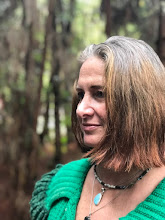Having harvested Mamaki leaves from Fieldhouse Farm, I am sipping on Mamaki tea, made from the dried leaves. If it is possible to make the tea from freshly picked leaves that is even better. I add a little honey to sweeten although it is nice without it as well.
Mamaki is a part of the nettle family and is
endemic (meaning that it only grows in Hawaii). In the
absence of predators, the nettle plant in Hawaii, grows without stinger hairs on the leaves which is very nice for when it comes time to pick it.
Mamaki is a tonic and cleansing agent (a diuretic). It is interesting that on the back of the leaves the veins are red - this is a way to identify that
Mamaki is a good blood tonic. I think it is best to drink it three days on two days off. Just one or two cups is sufficient - using about 6 leaves per cup (you can reuse the leaves once for the second cup.) Because
Mamaki is a diuretic, you should not exceed two cups per day and be sure to drink at least one glass of water which will also help with the purification of your system.
Helping to control high blood pressure and
cholesterol,
Mamaki is used for heart health. It has also been reported that drinking
Mamaki has helped numerous folks respiration system from the
VOG we sometimes experience here on the Big Island. It is also used to help with listlessness and to regain vitality from rundown states.
The berries that grow on the branches (which are white once they are ripe) are also helpful to the prostrate and urinary track, assisting to control the need to pee in the middle of the night as well as maintaining healthy yeast levels.


.jpg)

